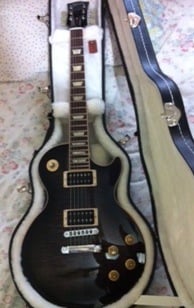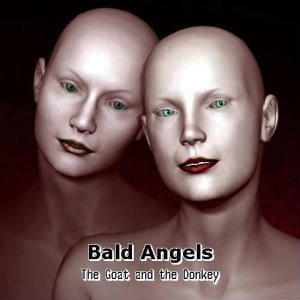/PAlogo_v2.gif)
/PAlogo_v2.gif) |
Any Prog characteristics in music theory? |
Post Reply 
|
Page 123 5> |
| Author | |||
HackettFan 
Forum Senior Member 

Joined: June 20 2012 Location: Oklahoma Status: Offline Points: 7951 |
 Post Options Post Options
 Thanks(0) Thanks(0)
 Quote Quote  Reply Reply
 Topic: Any Prog characteristics in music theory? Topic: Any Prog characteristics in music theory?Posted: May 16 2018 at 17:00 |
||
|
Many music styles are what they are by transforming something about prior music theory. For instance, Ragtime developed syncopation. Blues and Jazz made early use of progressions composed of successive dominant chords irrespective of their consistency with the diatonic scale of the resolving chord. Jazz developed a manner of playing leads over progressions such that those leads often changed scales and keys with every chord. Bebop invented new 8-note Bebop scales. Even Rock music changed aesthetic toward parallel fifths, which were previously avoided in Classical and Jazz, with the end result in Rock being power chords. So, I got to wondering. What about Prog? I put together three particular questions for this thread:
a) Is there any contribution that Prog has made to music theory? b) Is there any unusual aspect of music theory absent from, contrary to or marginal in other styles that has made a large contribution to Prog? c) Is there any aspect of music theory absent from, contrary to or marginal in other styles that has made a contribution to a particular Prog genre? The answer I lean toward for both (a) and (b) is ‘probably not’. There does not seem to be any explanation for what Prog characteristically is to be found in music theory, but I would be happy to hear suggestions. The answer to (c), I believe, shows more promise for yielding a positive answer, maybe. |
|||
|
A curse upon the heads of those who seek their fortunes in a lie. The truth is always waiting when there's nothing left to try. - Colin Henson, Jade Warrior (Now)
|
|||
 |
|||
Easy Money 
Special Collaborator 

Honorary Collaborator / Retired Admin Joined: August 11 2007 Location: Memphis Status: Offline Points: 10738 |
 Post Options Post Options
 Thanks(1) Thanks(1)
 Quote Quote  Reply Reply
 Posted: May 16 2018 at 18:22 Posted: May 16 2018 at 18:22 |
||
|
I have a masters degree in music theory and teach it to instrumental students who may be ready. As far as music theory goes, there is nothing unique in progressive rock. Anything that exists in prog rock already existed before the arrival of prog rock.
As far as music theory goes, I don't think its possible to come up with anything new anymore, just new untried combinations such as micro-tonal metal, odd-metered cumbia, bi-tonal swing, poly-rhythmic country ballads or hip-hop gamelan etc. Edited by Easy Money - May 16 2018 at 18:34 |
|||
 |
|||
Larkstongue41 
Forum Senior Member 

Joined: July 07 2015 Location: Eastern Canada Status: Offline Points: 1360 |
 Post Options Post Options
 Thanks(1) Thanks(1)
 Quote Quote  Reply Reply
 Posted: May 16 2018 at 19:07 Posted: May 16 2018 at 19:07 |
||
I have strong doubts about that. People probably thought the same about science and modern technologies a hundred years ago. Then again I know next to nothing about music theory but I'd be interested in hearing your reasoning.
|
|||
|
"Larks' tongues. Wrens' livers. Chaffinch brains. Jaguars' earlobes. Wolf nipple chips. Get 'em while they're hot. They're lovely. Dromedary pretzels, only half a denar."
|
|||
 |
|||
HackettFan 
Forum Senior Member 

Joined: June 20 2012 Location: Oklahoma Status: Offline Points: 7951 |
 Post Options Post Options
 Thanks(0) Thanks(0)
 Quote Quote  Reply Reply
 Posted: May 16 2018 at 19:08 Posted: May 16 2018 at 19:08 |
||
I should also throw out (for everyone) the caution that I carefully worded the questions in the OP such that it does not presume that something needs to be completely new and unattested ("...unusual aspect of music theory absent from, contrary to or marginal in other styles..."). There are, for instance, some things that occur in Jazz that had been previously attested in Classical music, but they were ubiquitous and characteristic of Jazz while not characteristic of Classical. Even with this softened level of claim, (a) and (b) look doubtful. Edited by HackettFan - May 16 2018 at 19:13 |
|||
|
A curse upon the heads of those who seek their fortunes in a lie. The truth is always waiting when there's nothing left to try. - Colin Henson, Jade Warrior (Now)
|
|||
 |
|||
Manuel 
Forum Senior Member 

Joined: March 09 2007 Location: United States Status: Offline Points: 13481 |
 Post Options Post Options
 Thanks(1) Thanks(1)
 Quote Quote  Reply Reply
 Posted: May 16 2018 at 19:29 Posted: May 16 2018 at 19:29 |
||
|
Interesting how the conversation is developing. Please keep it going.
|
|||
 |
|||
Easy Money 
Special Collaborator 

Honorary Collaborator / Retired Admin Joined: August 11 2007 Location: Memphis Status: Offline Points: 10738 |
 Post Options Post Options
 Thanks(0) Thanks(0)
 Quote Quote  Reply Reply
 Posted: May 16 2018 at 19:47 Posted: May 16 2018 at 19:47 |
||
From a music theory standpoint, jazz was a sort of hybrid between European harmonic language and African rhythms and African style group improvisation. The pentatonic scales of the blues man also comes from Africa and figured into jazz too. Of course the jazz artist did some interesting new things with these hybrids. Whats really interesting is starting in the 1920s - 30s, jazz and classical artists started listening to each other and influencing each other. You can hear parallel developments in people from the classical side such as Gershwin and Stravinsky, as well as on the jazz side from Ellington, Fletcher Henderson and Paul Whiteman. Its one of the more interesting periods in music history to me. This of course continues from there, for instance in the 60s you could hear Debussy and Ravel in the solos of Herbie Hancock and Bill Evans, or today you can hear Steve Reich in the work of Craig Taborn. On the classical side, its hard to think of a 20th century composer who wasn't influenced by jazz. A great overlooked 20th century composer is William Grant Still who wrote classical music with the grace and economy of Mozart, but with a blues language. Edited by Easy Money - May 16 2018 at 19:53 |
|||
 |
|||
The Dark Elf 
Forum Senior Member 

VIP Member Joined: February 01 2011 Location: Michigan Status: Offline Points: 13368 |
 Post Options Post Options
 Thanks(0) Thanks(0)
 Quote Quote  Reply Reply
 Posted: May 16 2018 at 20:40 Posted: May 16 2018 at 20:40 |
||
|
Well, Jethro Tull is, I believe, the only band ever to have a top ten hit with a song in 5/4 time.

|
|||
|
...a vigorous circular motion hitherto unknown to the people of this area, but destined
to take the place of the mud shark in your mythology... |
|||
 |
|||
HackettFan 
Forum Senior Member 

Joined: June 20 2012 Location: Oklahoma Status: Offline Points: 7951 |
 Post Options Post Options
 Thanks(0) Thanks(0)
 Quote Quote  Reply Reply
 Posted: May 16 2018 at 21:01 Posted: May 16 2018 at 21:01 |
||
 Cross-pollination is a wonderful thing. Cross-pollination is a wonderful thing.Let me ask this concerning Jazz-Rock Fusion. John McLaughlin predicated his music on Modal Jazz. Do you have any observation on how much Jazz Fusion followed Modal Jazz as opposed to earlier cadential forms? (For anyone who doesn't know, cadential music is what most traditional music is, with a chord progression that seeks resolution on a particular chord. Modal Jazz ditches the idea seeking resolution and moves the emphasis away from mirroring a progression of chords to creating a statement with scales.) |
|||
|
A curse upon the heads of those who seek their fortunes in a lie. The truth is always waiting when there's nothing left to try. - Colin Henson, Jade Warrior (Now)
|
|||
 |
|||
Tom Ozric 
Prog Reviewer 

Joined: September 03 2005 Location: Olympus Mons Status: Offline Points: 15926 |
 Post Options Post Options
 Thanks(0) Thanks(0)
 Quote Quote  Reply Reply
 Posted: May 16 2018 at 21:13 Posted: May 16 2018 at 21:13 |
||
|
|||
 |
|||
Easy Money 
Special Collaborator 

Honorary Collaborator / Retired Admin Joined: August 11 2007 Location: Memphis Status: Offline Points: 10738 |
 Post Options Post Options
 Thanks(0) Thanks(0)
 Quote Quote  Reply Reply
 Posted: May 17 2018 at 00:55 Posted: May 17 2018 at 00:55 |
||
|
Re Hackett Fan Re Modal jazz:
Modal jazz was a reaction to the increasing difficulties of playing bebop. Bebop tended to move at a fast clip and there was a new chord every bar, or sometimes two to a bar, requiring a person to be constantly switching up scales etc. As you pointed out, as in western harmony, these chords were 'functional' in that one logically lead to the next very much like classical music or sophisticated pop music. In modal jazz there was a static simplified chord progression that allowed the musician to just stay on one scale, or maybe alternate between two scales etc. This made soloing easier, but these musicians weren't just lazy, they were looking for a new way to play, anything gets old after a while. In this sense, yes, most fusion is modal, so is most rock, blues, RnB etc. Soloing over some pop tunes, such as "My Cherie Amour" for example, requires that you keep changing your 'harmonic language' ie scales, while in most extended rock and fusion jams, you can camp out on one scale and let it rip. There is some fusion that does have more complicated chord progressions, such as some Pat Methenay, or some of the music McLaughlin plays today. Fusion with a faster changing chord progression is not uncommon in today's jazz, but most early fusion was modal, such as Mahavishnu etc. A lot of jazz musicians get bored playing modally, it can lack challenge as well as just not give you anything to work with melodically. This is why the big resurgence of post bop happened in the 80s-90s up to today. Edited by Easy Money - May 17 2018 at 00:58 |
|||
 |
|||
Tom Ozric 
Prog Reviewer 

Joined: September 03 2005 Location: Olympus Mons Status: Offline Points: 15926 |
 Post Options Post Options
 Thanks(0) Thanks(0)
 Quote Quote  Reply Reply
 Posted: May 17 2018 at 01:09 Posted: May 17 2018 at 01:09 |
||
|
maybe a branch from the intended discussion, ; a style that has baffled me forever - Free Jazz. What is the purpose ?? i love Soft Machine, Elton Dean, Henry Cow etc. when they break in to an Avante piece of music, it throws me 6 feet the opposite direction of my mindset. i love what these gifted musicians do, but i just don’t get the semmingly ‘randomness’ of it all. a good example is an Elton Dean Quintet album in have - Boundaries. it’s a difficult listen to me (as open as my ears/mind can be) but i persist, enjoy, and even ‘wow’ at this form of music and structure. what am i missing ??
|
|||
 |
|||
BaldJean 
Prog Reviewer 

Joined: May 28 2005 Location: Germany Status: Offline Points: 10387 |
 Post Options Post Options
 Thanks(0) Thanks(0)
 Quote Quote  Reply Reply
 Posted: May 17 2018 at 04:16 Posted: May 17 2018 at 04:16 |
||
I don't understand the third question; can you please elaborate? I don't see how "an aspect of music theory" can make a contribution to a musical genre
|
|||
 A shot of me as High Priestess of Gaia during our fall festival. Ceterum censeo principiis obsta |
|||
 |
|||
Easy Money 
Special Collaborator 

Honorary Collaborator / Retired Admin Joined: August 11 2007 Location: Memphis Status: Offline Points: 10738 |
 Post Options Post Options
 Thanks(0) Thanks(0)
 Quote Quote  Reply Reply
 Posted: May 17 2018 at 06:01 Posted: May 17 2018 at 06:01 |
||
Some people like it and some people don't, but free jazz is exactly just that, they are improvising without any set chord progression, tonal center or even steady time. Everyone is just winging it. For my own tastes, I thought it was kind of interesting when it first appeared in the 60s, but over time it has become somewhat repetitive and predictable. |
|||
 |
|||
Tom Ozric 
Prog Reviewer 

Joined: September 03 2005 Location: Olympus Mons Status: Offline Points: 15926 |
 Post Options Post Options
 Thanks(0) Thanks(0)
 Quote Quote  Reply Reply
 Posted: May 17 2018 at 08:09 Posted: May 17 2018 at 08:09 |
||
|
^ So when folks say ‘oh, sounds like a bunch of 5 year olds let loose in the music room’, then that’s an apt description ?? I hope its more than that.
It fascinates me, engages me (especially Soft Machine’s segments) but leaves me questionoing........ |
|||
 |
|||
dr wu23 
Forum Senior Member 

Joined: August 22 2010 Location: Indiana Status: Offline Points: 20697 |
 Post Options Post Options
 Thanks(0) Thanks(0)
 Quote Quote  Reply Reply
 Posted: May 17 2018 at 08:35 Posted: May 17 2018 at 08:35 |
||
|
What exactly is 'music theory'....or should I just look it up on Wiki...?
;)
|
|||
|
One does nothing yet nothing is left undone.
Haquin |
|||
 |
|||
Guldbamsen 
Special Collaborator 

Retired Admin Joined: January 22 2009 Location: Magic Theatre Status: Offline Points: 23122 |
 Post Options Post Options
 Thanks(0) Thanks(0)
 Quote Quote  Reply Reply
 Posted: May 17 2018 at 09:30 Posted: May 17 2018 at 09:30 |
||
I have to be in the right frame of mind to appreciate free jazz. It's something one can "learn" to appreciate, just like any other form of music. I tend to look at the human aspect of this ie simply how difficult it is to wrap one's head around music that doesn't behave as 'regular' music. Pretty simple. It's the same reason a guy like Igor Wakhevitch remains in the shadows on PA. His music, while carefully orchestrated, still works in much the same way. It reaches your ears and you have absolutely no frame of reference, because the "unofficial rules of music" are being broken and bent in ways that'll have your brain jumping out your ear. Then maybe one day something happens while your listening and the world opens up and you somehow 'understand' the irregulars and off-kilter lingo happening, and it or something makes sense. It happened to me in a big way with Igor, but also with the likes of Eric Dolphy, Coltrane and Pharoah Sanders. Nowadays I can get chills to some of it....again if I'm in the mood (for love). Then it speaks to me like nothing else - often reminding me of the universe however corny that may sound...but it does. Free jazz or indeed free music is perhaps the best musical adaptation of life, the universe and everything. Genesis generally boils down to this beautiful irregular and chaotic event. Free jazz is like that. A snapshot of life's inception. ...yeah or maybe I just bumped my head one too many times. Also may I just add that it's been absolutely topdollar to have John come join the party 
|
|||
|
“The Guide says there is an art to flying or rather a knack. The knack lies in learning how to throw yourself at the ground and miss.”
- Douglas Adams |
|||
 |
|||
BaldJean 
Prog Reviewer 

Joined: May 28 2005 Location: Germany Status: Offline Points: 10387 |
 Post Options Post Options
 Thanks(0) Thanks(0)
 Quote Quote  Reply Reply
 Posted: May 17 2018 at 09:38 Posted: May 17 2018 at 09:38 |
||
by "Genesis" you probably don't mean the band but "origin, creation"
|
|||
 A shot of me as High Priestess of Gaia during our fall festival. Ceterum censeo principiis obsta |
|||
 |
|||
Guldbamsen 
Special Collaborator 

Retired Admin Joined: January 22 2009 Location: Magic Theatre Status: Offline Points: 23122 |
 Post Options Post Options
 Thanks(0) Thanks(0)
 Quote Quote  Reply Reply
 Posted: May 17 2018 at 09:47 Posted: May 17 2018 at 09:47 |
||
 but then again those are both synonyms for genesis ie the start/beginning of something. but then again those are both synonyms for genesis ie the start/beginning of something.
|
|||
|
“The Guide says there is an art to flying or rather a knack. The knack lies in learning how to throw yourself at the ground and miss.”
- Douglas Adams |
|||
 |
|||
Easy Money 
Special Collaborator 

Honorary Collaborator / Retired Admin Joined: August 11 2007 Location: Memphis Status: Offline Points: 10738 |
 Post Options Post Options
 Thanks(0) Thanks(0)
 Quote Quote  Reply Reply
 Posted: May 17 2018 at 10:07 Posted: May 17 2018 at 10:07 |
||
Often times music theory is something that happens after the fact, after the music has already been created. Think of the music theorist as similar to a herpetologist who spots an interesting reptile in the jungle and then goes home to document this creature. So the music theorist looks at a piece of music and tries to classify what is happening in that music as regards melody, harmony and rhythm. Music theory isn't about setting down a bunch of rules that can be followed or broken. Anybody can write great music, you don't need to know any theory to do that, but music theory is a way to classify and describe what is happening in a piece of music for those who are interested in such things. Of course someone who knows their music theory may apply it when trying to come up with ideas, but once again, you don't have to know theory to write interesting music. Edited by Easy Money - May 17 2018 at 10:22 |
|||
 |
|||
dr wu23 
Forum Senior Member 

Joined: August 22 2010 Location: Indiana Status: Offline Points: 20697 |
 Post Options Post Options
 Thanks(0) Thanks(0)
 Quote Quote  Reply Reply
 Posted: May 17 2018 at 10:34 Posted: May 17 2018 at 10:34 |
||
|
Thanks for that....sort of clears it up...;)
|
|||
|
One does nothing yet nothing is left undone.
Haquin |
|||
 |
|||
Post Reply 
|
Page 123 5> |
| Forum Jump | Forum Permissions  You cannot post new topics in this forum You cannot reply to topics in this forum You cannot delete your posts in this forum You cannot edit your posts in this forum You cannot create polls in this forum You cannot vote in polls in this forum |